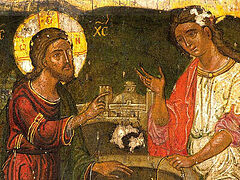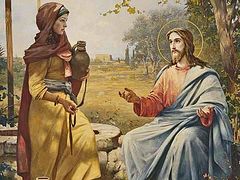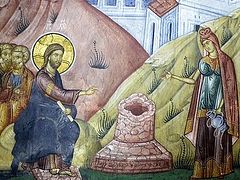 Christ and the Samaritan Woman. G.I. Semiradsky. Canvas, oil. 101x183. 1890. Lviv Art Gallery
Christ and the Samaritan Woman. G.I. Semiradsky. Canvas, oil. 101x183. 1890. Lviv Art Gallery
Dear brothers and sisters,
Today we have heard an excerpt from the Gospel of John containing the conversation of the Lord with the Samaritan Woman. This meeting took place at the hottest moment of a hot day near Jacob’s Well in Samaria, where the Lord came to quench His bodily thirst, while at the same time a woman came to draw some water from the spring.
For us monks of Valaam Monastery, living by Lake Ladoga in Karelia, clean running water is commonplace, but for inhabitants of desert cities, towns and villages in Israel, such water has always been precious and vital.
Christ begins his conversation with the Samaritan Woman by asking her to give Him some water from the well. The woman was surprised that the Lord, being a Jew, communicated with her freely, since there was hostility and disagreement between Judea and Samaria in matters of faith. Despite all these differences and enmity, Christ foresaw the spiritual thirst and faith of the woman.
Having started speaking to her about water and bodily thirst, in the course of His conversation with the Samaritan Woman the Lord exposes the secrets of her personal life, and then their talk gradually turns to spiritual themes. Struck by the Savior’s clairvoyance, the woman begins to see in Him not just a man, but a prophet, and finally the Lord reveals Himself to her as the Savior and Messiah.
The Samaritan Woman found great happiness at the well; she met God and believed in Him. Through her, nearly the entire city received the precious gift of faith in the Savior.
The main key point in Christ’s conversation with the Samaritan Woman for all of us is that the Lord reveals to us the secret of how to worship and honor God properly: But the hour cometh, and now is, when the true worshippers shall worship the Father in spirit and in truth: for the Father seeketh such to worship Him. God is a Spirit: and they that worship Him must worship Him in spirit and in truth (Jn. 4:23-24). Before the coming of Christ to earth, believers in the one God were given the Law of Moses, and a special place was set aside for the service and worship of God. Initially, it was the Tabernacle—a portable temple, then the Temple in Jerusalem was built. The Jews prayed in the Temple of Jerusalem, whereas the Samaritans built their sanctuary on Mount Gerizim.
Although the Jews were faithful to God in their worship and the Samaritans were not, with the coming of the Savior a new era and a new form of worship came. The Lord somewhat unravels this mystery to the Samaritan Woman—that He is the Messiah and with His coming a new age of worshipping God in the spirit and the truth had come.
The Lord did not come to save the Jews alone, but all people from different nations and tribes who would believe in Him; and that sinner Samaritan Woman was one of the first after the Apostles to be called by Him for salvation.
Dear brothers and sisters, the Lord gave us His Church so that we may have the fullness of joy and spiritual life. He gave us churches as places of His special presence where the grace of the Holy Spirit dwells. Churches of God can be found around the globe. Wherever we go, we can pray and participate in the sacraments of the Church and be filled with spiritual nourishment.
But the Lord does not limit His presence only to churches of God. He is higher than all earthly and material things. He is not bound by any place, space or time. He is a Spirit and wants us to worship Him in spirit and in truth.
What does this mean? As the Holy Fathers teach us, man himself is the temple of God. This temple was created for God to dwell in—it is us, our spirit, soul and body—the whole person is supposed to be the temple of God. “The Holy Church of God is like a man, because for the soul it has the sanctuary, for the mind it has the table of oblation, and for the body it has the temple. For, the Church is the image and likeness of man, who was created in the image and likeness of God” (St. Maximus the Confessor, Mystagogy).
The fact that we pray, attend church services, and participate in them is very good and pleasing to God, and we certainly need it; but the Lord expects More from us—namely, that our heart belong to Him.
He wants our entire lives outside of church and worship to be burning candles and pleasing sacrifices to Him. We will not begin to worship God in the spirit and the truth until we rebuild our lives according to the Gospel and the commandments of God, instead of living according to the will of the flesh, passions and our desires.
The Lord teaches us: Walk in the Spirit, and ye shall not fulfil the lust of the flesh (Gal. 5:16). That is, every day we die for the flesh, for the world and for the passions. To follow the Lord and live for Him means to worship Him. And the truth is the Lord: He is the Way, the Truth, and the Life.
Passions are untruth. Passions are the world, and serving them means hating God. He who worships God in the spirit crucifies the flesh and does not do the works of the flesh.
Dear brothers and sisters, you and I are called to live in the realm of joy in the Holy Spirit, in unceasing Communion with God and prayer, and to be living temples of God. And if we deviate from our calling we will be overtaken by sorrows and troubles, nothing will make us glad or happy in this life, and we will live in despondency.
The main cause of our melancholy and depression is that, having forgotten about Christ, Who is the Source of living water, we seek solace in the muddy sources of earthly, mental, or bodily pleasures, where there is no happiness. The human spirit, created by God, cannot be satisfied with anything earthly; it finds peace in God alone and quenches its thirst in Him.
Like the Samaritan Woman, let us throw ourselves in prayer and repentance at the feet of Christ, the Source of living water. Let us set priorities in our lives, let us deny ourselves and begin to live for God and for our neighbor. Then our souls will find peace and comfort.
Amen.



